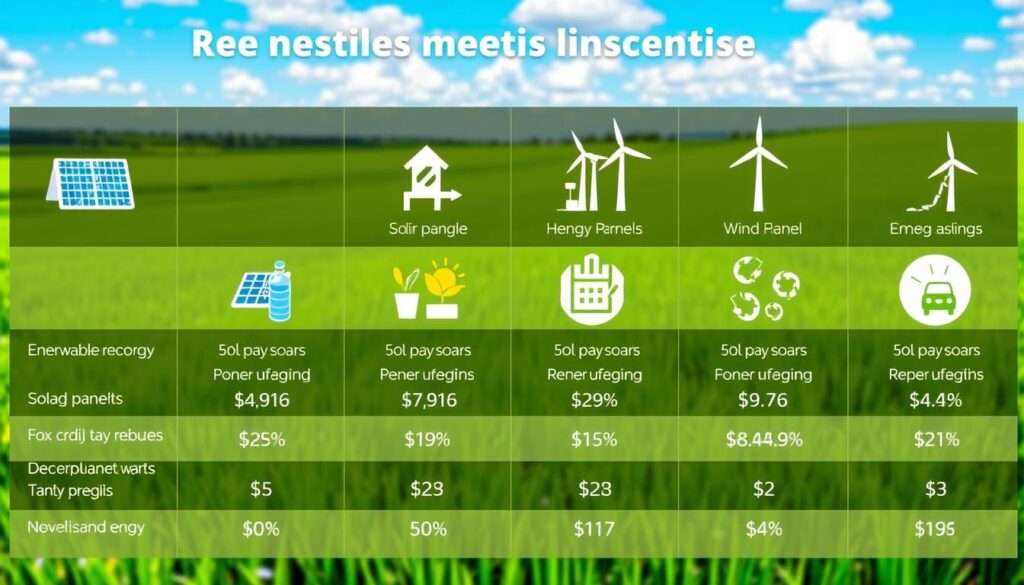New Hampshire has seen a big jump in solar energy use in recent years, which shows the state’s strong support for green energy. With lots of sunlight all year, people can use solar energy to power their homes and save money on bills.
Thanks to special programs and tax breaks, getting free solar panels in New Hampshire is easier than ever. These benefits make solar energy a wise choice for many.

We will investigate how homeowners in New Hampshire can get free solar panels. We will also clarify any myths and discuss the benefits of solar energy.
Key Takeaways
- New Hampshire’s solar energy adoption is rapidly increasing.
- Free solar panels are accessible through various state programs.
- Residents can benefit from solar tax credits and other financial incentives.
- Renewable energy is crucial for sustainability and cost savings.
- Understanding energy savings calculators can enhance solar investment decisions.
Understanding Solar Energy in New Hampshire
New Hampshire has been working hard to use more renewable energy. Solar energy is leading the way, helping fight climate change and cut down on fossil fuels. The state aims to use more renewable energy by 2025, showing its environmental commitment.
The Importance of Renewable Energy
Renewable energy is key to solving many environmental problems. Using solar energy can greatly reduce harmful emissions and make us less dependent on fossil fuels. In New Hampshire, solar energy is creating jobs and boosting the economy. It helps make our planet healthier and our future more sustainable.
How Solar Energy Works
Solar energy uses photovoltaic systems to turn sunlight into electricity. These systems have photovoltaic cells that catch sunlight and create electricity. Important parts of solar systems include:
- Inverters: These change direct current (DC) from solar panels to alternating current (AC), which homes use.
- Batteries: These store extra energy made during sunny times for use when it’s not as bright.
- Grid-tied vs. Off-grid systems: Grid-tied systems share energy with the grid and use net metering. Off-grid systems only use solar energy.
For homeowners in New Hampshire, knowing how to use solar energy well is important. Studies show that solar systems save money on bills and increase property value. They are a smart choice for the future.
Related Post: Community Solar Programs in the U.S
Free Solar Panels New Hampshire: Your Path to Savings
Many people in New Hampshire can get free solar panels through different solar programs. Knowing who can get these panels is key. Things like how much you make, what kind of property you have, and your credit score matter a lot. The New Hampshire Solar Energy Association helps guide you through the application process.
Eligibility for Free Solar Panel Programs
To get free solar panels in New Hampshire, you need to meet some rules. Here are the main ones:
- Your household income must be below a certain level.
- Only single-family homes and some multi-family units qualify for solar panels.
- Having a good credit score helps, but some programs are more flexible.
Use an energy savings calculator to see how much you could save. This helps you decide if joining these solar programs is worth it.
Common Myths About Free Solar Panels
Many wrong ideas about solar energy might stop people from applying. It’s important to know these myths to make smart choices. Here are some common ones:
- Myth: Free solar panels are of lower quality.
Fact: Many trusted companies offer top-notch panels through these programs. - Myth: There are hidden costs.
Fact: Good programs are upfront about all costs and what you need to do. - Myth: Solar panels need a lot of upkeep.
Fact: Solar panels are easy to care for and often come with warranties.
It’s crucial to know these myths to help more homeowners in New Hampshire take advantage of free solar panels.
Exploring Renewable Energy Incentives
Getting to know the financial side of solar energy can be tricky but rewarding. Homeowners in New Hampshire have many options to save money. These include state and federal incentives that make solar installations more affordable.
Overview of State and Federal Incentives
The Federal Solar Investment Tax Credit (ITC) is a big help for those wanting solar energy. It lets you deduct a part of the solar system cost from your taxes. This, combined with state incentives, can lead to big savings.
- Solar tax credits reduce your taxable income based on the cost of your installation.
- Local tax exemptions help to maintain property value by excluding solar systems from property tax assessments.
- Federal incentives play a crucial role in making solar energy more accessible to average homeowners.
Navigating Solar Rebates in New Hampshire
In New Hampshire, solar rebates offer a big financial boost for those going solar. Programs like solar rebates in New Hampshire help make solar tech more affordable. Here’s how to make the most of these programs:
- Research eligible solar rebate programs and understand specific qualification requirements.
- Prepare necessary documentation, including proof of purchase and installation agreements.
- Submit applications promptly to ensure alignment with rebate deadlines.
By following these steps, homeowners can get the most out of their solar investment. This not only saves money but also helps the environment. With the right planning, every homeowner can enjoy the benefits of solar energy.

| Incentive Type | Description | Potential Savings |
|---|---|---|
| Federal Solar Investment Tax Credit | Tax credit based on installation costs | Up to 26% of installation costs |
| Solar Rebates New Hampshire | State-level financial rebates for solar systems | Variable based on system size and eligibility |
| Property Tax Exemption | Exemption from property taxes for solar installations | Potentially thousands in tax savings |
Maximizing Benefits with Net Metering Programs
Net metering is key for those moving to solar energy at home. It lets homeowners get credits for extra energy their panels make. This way, New Hampshire residents can save more on solar energy and help the planet.
What is Net Metering?
Net metering lets homeowners with solar panels sell extra energy to the grid. The utility company gives energy credits for this. These credits lower your monthly bill, saving you money over time.
How Net Metering Works for Homeowners
Homeowners in New Hampshire can control their energy use and costs with net metering. Here’s how it works:
- The solar panels make energy for the home.
- Extra energy made during the day goes back to the grid.
- The utility company measures this energy and gives credits.
- When the panels don’t make enough energy, credits help lower costs.
By choosing the right solar system size, homeowners can get the most credits. This means better savings on solar energy. Here’s a look at possible savings with different system sizes:
| System Size (kW) | Annual Generation (kWh) | Estimated Billing Credits ($) |
|---|---|---|
| 3 kW | 4,200 | $630 |
| 5 kW | 7,000 | $1,050 |
| 7 kW | 9,800 | $1,470 |
| 10 kW | 12,000 | $1,800 |
Knowing how net metering works helps homeowners make smart solar choices. This leads to energy freedom and long-term savings.

Conclusion
As we finish our look at solar energy in New Hampshire, it’s clear that getting free solar panels is key. Homeowners can cut their energy costs and help the environment. With many programs out there, switching to solar is easier than ever.
Using free solar panels in New Hampshire does more than save money. It also helps the environment. By joining these efforts, homeowners support New Hampshire’s green goals. This shows how one person can make a big difference.
If you want to join this effort, start by learning about the programs and incentives. Talk to local solar companies for advice. By choosing solar energy, you’re helping your home and the planet today.
FAQ
What are the eligibility requirements for free solar panels in New Hampshire?
To get free solar panels in New Hampshire, you need to meet certain criteria. This includes your income, the type of property you own, and your credit score. Many programs help low- and moderate-income families. So, it’s best to check with local providers for the exact requirements.
Are there any hidden costs associated with free solar panel installations?
No, good solar companies don’t hide costs. But, you might face maintenance or system upgrade costs later. Always read your contract carefully and talk to your provider to avoid surprises.
How do solar rebates work in New Hampshire?
Solar rebates in New Hampshire give financial help for installing solar panels. These rebates can lower the cost of solar panels for your home. Each rebate program has its own rules and amounts, so it’s important to do your research.
What are net metering programs?
Net metering programs let homeowners with solar panels get credits for extra energy sent to the grid. This can lower your electricity bills, saving you money.
How can I calculate my potential energy savings from solar panels?
Use an energy savings calculator to estimate your savings. These calculators look at your energy use, panel efficiency, and local rates. They give you a personalized idea of how much you could save.
Are there any solar tax credits available in New Hampshire?
Yes, there are federal and state solar tax credits in New Hampshire. The Federal Solar Investment Tax Credit (ITC) lets you deduct part of your solar costs from your taxes.
Will my home value increase with a solar panel installation?
Usually, yes. Solar panels can make your home more valuable. Many people want energy-efficient homes. Plus, solar energy can lower your bills, making your home more appealing to buyers.